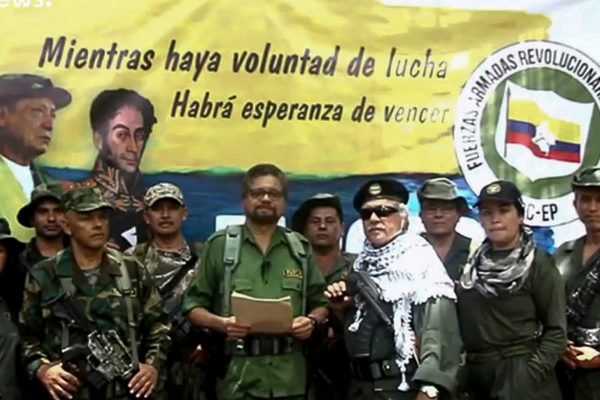- Colombia: Former FARC leader Iván Márquez announces that he retakes his arms
- Murders: Colombia shouts "no more" deaths of social leaders
Only the confirmation was missing. The return to arms was well announced. Iván Márquez moved away from the peace process a long time ago and Oscar Montero, alias "El Paisa" had done the same, perhaps the most murderous and dangerous guerrilla of the renewed terrorist organization. With them appeared Jesus Santrich, to whom the Supreme Court and the JEP (Special Jurisdiction for Peace) granted freedom despite the well-founded suspicions that he would end up joining the FARC-EP dissent.
They presented themselves in society as the guerrillas do in Colombia, wearing political clothes that are still a mere criminal group that feeds their coffers with drug trafficking and extortion. The problem on this occasion is that Márquez, in his pompous speech, once again raised the flag of "the combination of forms of struggle" that the Colombian Communist Party advocated in the past and that was one of the causes of the horrific extermination of the Union Patriotic
Appealing to the social struggle and using a language similar to that of left-wing and extreme-left populist parties and movements that play in democracy means encouraging political violence just two months after the local elections. It should not be forgotten that in the areas that abandoned the former Revolutionary Forces of Colombia, the security situation is dramatic due to the presence of a tidal wave of cartels and powerful gangs, heiresses of the paramilitaries, in addition to the ELN and EPL and other FARC dissidents getting stronger
If the drip of murders of social leaders was already worrisome, Márquez's words only expose their lives and extend the threat to the candidates of Gustavo Petro's Human Colombia and the FARC (Common Alternative Force) party. For the Duke government, it was a challenge to ensure that the candidates of this last party could campaign without problems, but now the challenge seems enormous.
In addition to assuring dozens of candidates in territories not controlled by the Army and where the State is stunted, it must correct and strengthen its security policy, led by a defense minister who does not build trust and who applies the same traditional remedies to combat a virus that has mutated.
The announcement also means a slap to the JEP, too slow in making decisions with those who give ample signs of breaching the conditions of the peace process, as well as those who believed that Colombia could leave behind the armed conflict with a simple list of unviable promises signed in Havana. He also notes that quadrupling the cultivated area of coca, up to 200,000 hectares, would have dire consequences, as well as maintaining an allied government of the Mafia and terrorism in Caracas, a risk not only for Venezuela but for the entire Andean region.
On the political level, the polarization between the critics of the negotiations led by Juan Manuel Santos and those who defend them at all costs is deepened. And further away the possibility that the current government sits at the table with the ELN to seek an agreement not only because it continues to defend the kidnapping as a financing weapon but also for the alliances it will establish with Márquez and his henchmen.
In sum, bad news anticipated members of the Army intelligence services to THE WORLD. For them, several FARC commanders, with Márquez in the lead, never completely left their weapons but kept one foot on each side. The question is to know who is 100% committed to peace and who is still swimming between the two shores.
According to the criteria of The Trust Project
Know more- FARC
- Venezuela
- Juan Manuel Santos
- THE WORLD
- Defense and Justice
Impression Colombia: it's not a fight, it's terrorism
TadeuRelato
Print Venezuela, cornered

